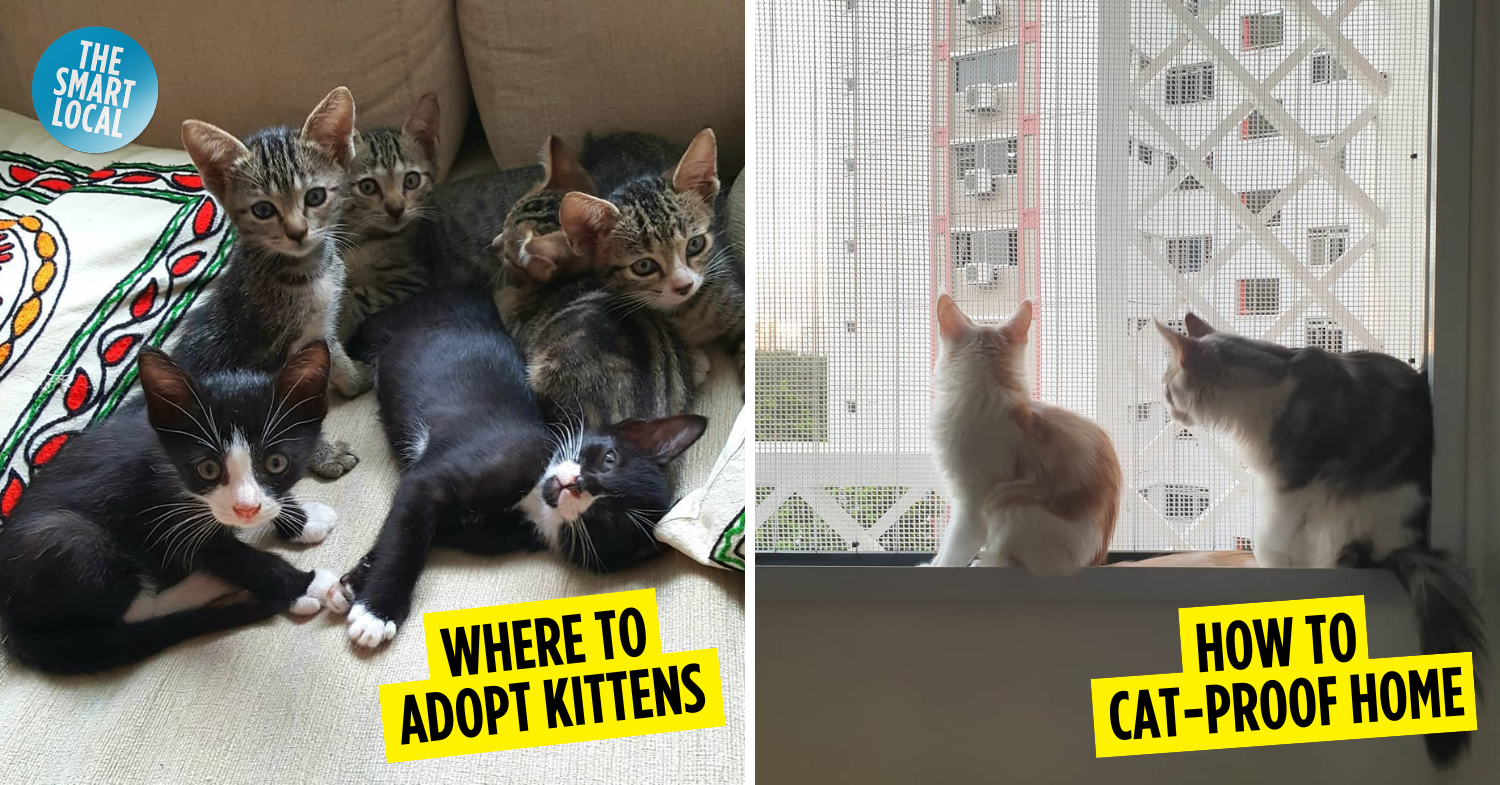First-time cat owner guide in Singapore
Nothing much needs to be said about cats: the internet loves them, and so do we. They’re fluffy, alien-like, and filled with personality, so it’s no wonder many Singaporeans want them as companions. Whether you’re waiting till you get your own place to have your own furbaby, or are simply looking for a pet that’s worthy of internet memes, this first-time cat owner guide is for you.
From purchasing essentials to cat-proofing your home, here’s what you’ll be getting yourself into:
Table of Contents
- First-time cat owner guide in Singapore
- What to know about owning a cat in Singapore
- Should I get a kitten or a cat?
- What cat breed should I get?
- Where to get a cat in Singapore
- Cat-proofing your home
- Shopping checklist for your first cat
- Cat maintenance – how much it costs and how to care for them
- Bringing your first cat home
- Guide for first-time cat owners
If you’re an aspiring cat person, read these:
What to know about owning a cat in Singapore
Let’s first address the latest developments in cat ownership in Singapore: from 1st September 2024 onwards, up to 2 cats and 1 approved dog breed will be allowed in HDB flats in Singapore. Previously, cat ownership in HDBs was not allowed, while private residences were allowed to keep up to 3 cats.
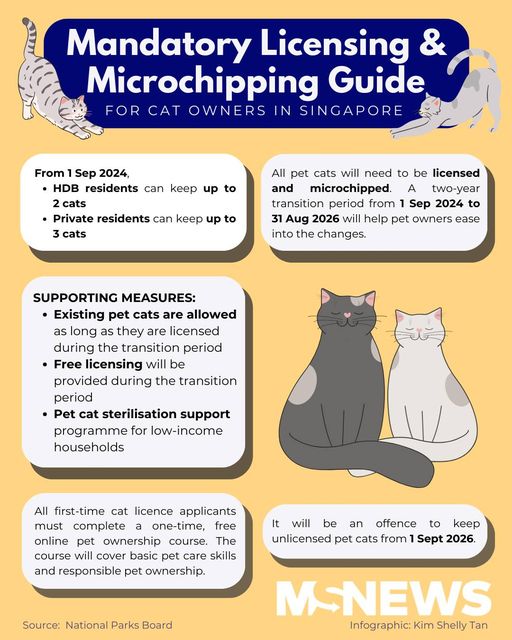
Image credit: Mustsharenews via Facebook
There will be a 2-year-long transition period between 1st September 2024 and 31st August 2026 for cat owners to adapt to the changes. Among these changes, cat owners must license and microchip their felines. Owners must also be able to take care of their cats’ health and welfare. Those who don’t comply with HDB’s rule may face a fine of up to $4,000.
Continue reading to find out more about what factors to consider when getting a cat, how to prepare your home, and how much it costs to own a cat in Singapore.
Should I get a kitten or a cat?
Kittens – below 1 year old
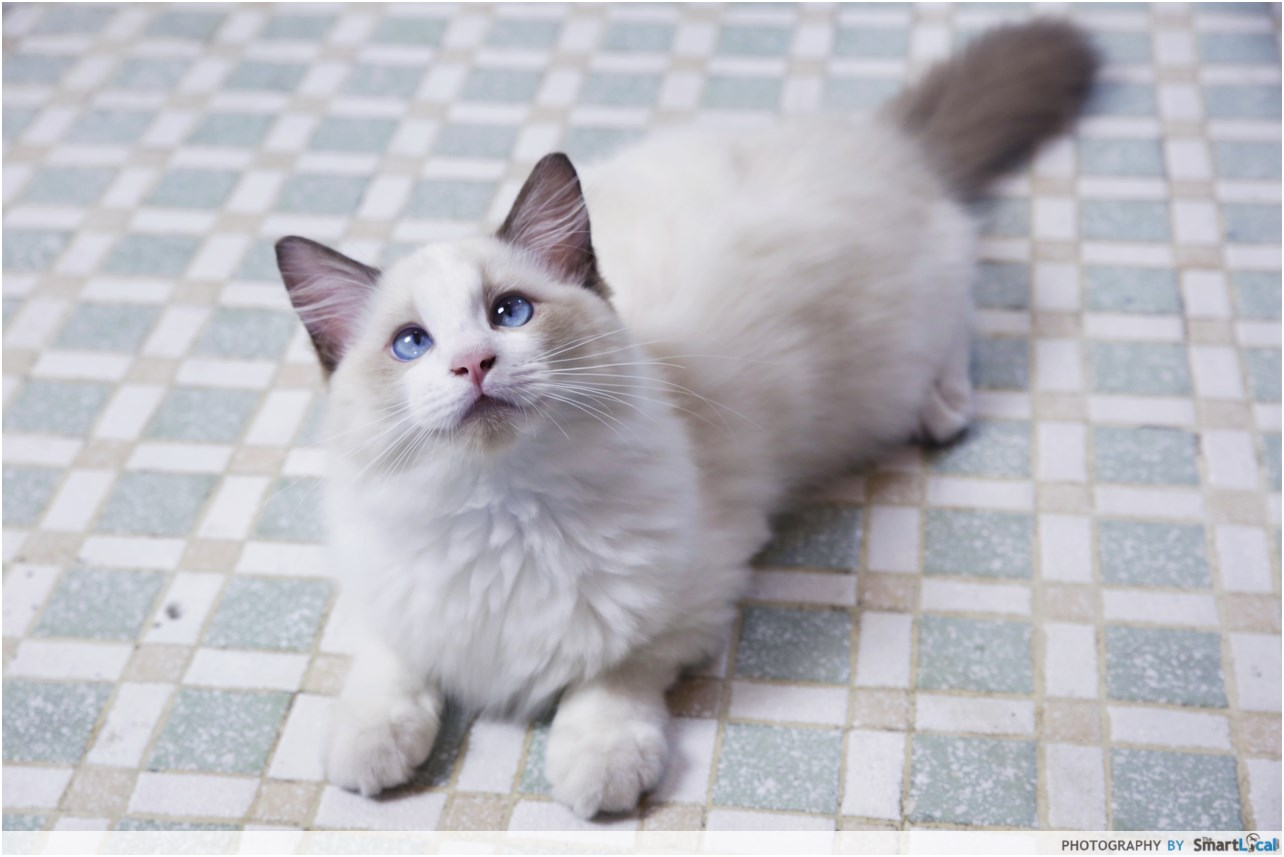
For many, kittens may be the preferred route to go – after all, they’re easier to train and assimilate with other pets. As their personalities are still developing, they may also be more suitable for households with kids or for first-time pet owners.
They’re still “babies” themselves, so you’ll need to dedicate a little more care and attention towards them. They’ll require litter box training and vet visits to get them vaccinated and dewormed. Kittens can also be trained to get used to things cats notoriously hate like taking baths and trimming nails.
You’ll have to get them neutered at around 4-6 months of age. At this age, kittens that aren’t sterilised will yowl loudly, pee around the house, attempt to escape, and might even get aggressive and restless as they search for a mate.
P.S. Owners are not recommended to allow their cats to breed as it may affect their health, cause out-of-control local cat population, and cases of abandonment. Neutering them also helps to keep their hormones regulated, which allows them to live a more stress-free life.
Cats – 1 year old onwards
When it comes to bringing a new pet into your home, adult cats are arguably on the less popular end of the scale. Unlike kittens, cats tend to have more developed personalities, and may require more patience to train if they’re already set in their ways.
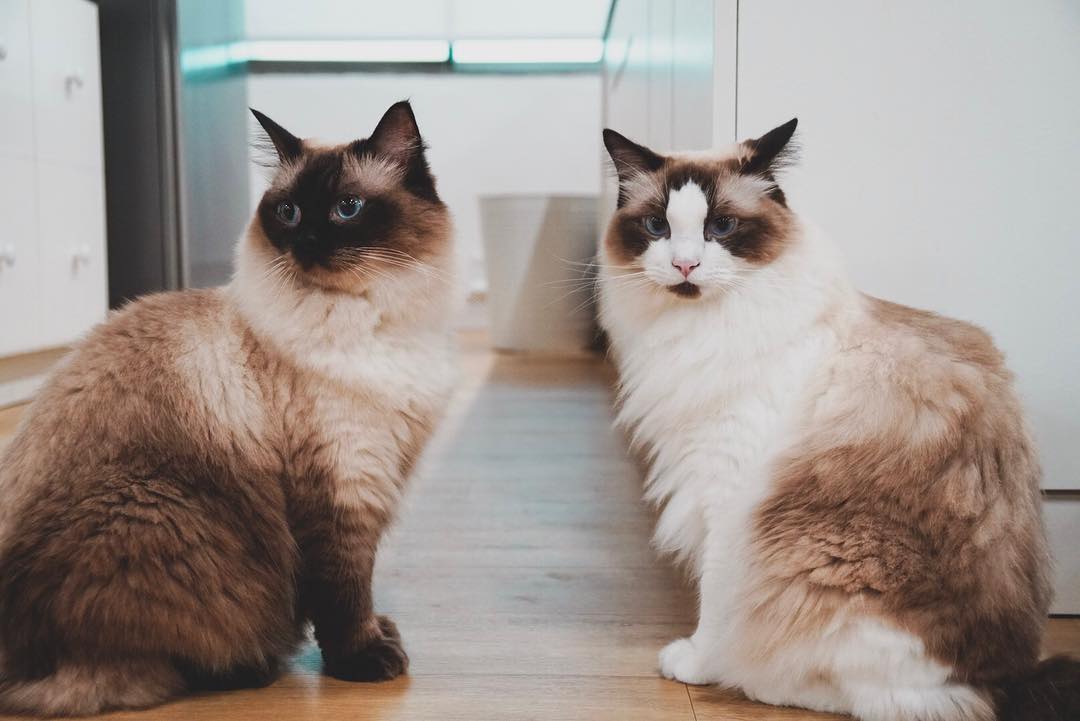
Image credit: @jaymeetheragdoll via Instagram
But this doesn’t mean that adult cats don’t make equally loving companions. For example, a cat that had been previously abused or abandoned may change from being timid and aloof to cuddly and playful if paired with the right household.
What cat breed should I get?
We’re all for the #adoptdontshop movement, but some households may opt for pedigree cats for specific personality traits. These may be more suitable for first-time owners or those with kids.
Here are some of the most common cat breeds in Singapore:
- Ragdoll: Quiet, playful, dog-like, likes to follow owners around
- British Shorthair: Affectionate, calm, will follow you around
- Persian: Calm lap cats, laid back, may require higher maintenance
- Maine Coon: Affectionate, playful, dog-like, follows owners around
- Bengal: Energetic, inquisitive
- Munchkin: Active, intelligent
- Ragamuffin: Docile, known to be lap cats, affectionate

Bengal cat.
Image credit: Wikipedia
Of course, local cats – commonly referred to as domestic shorthairs – and mixed breed cats can also possess these personality traits. You may want to arrange for a face-to-face session with the kitty you’re eyeing before committing to it. This will help you gauge if you can gel with your pet-to-be – kind of like dating before marriage.
Where to get a cat in Singapore
Adopting a cat
It goes without saying that there are always cats and kittens in Singapore that need homes, so animal-lovers would recommend potential owners to consider adopting over buying.
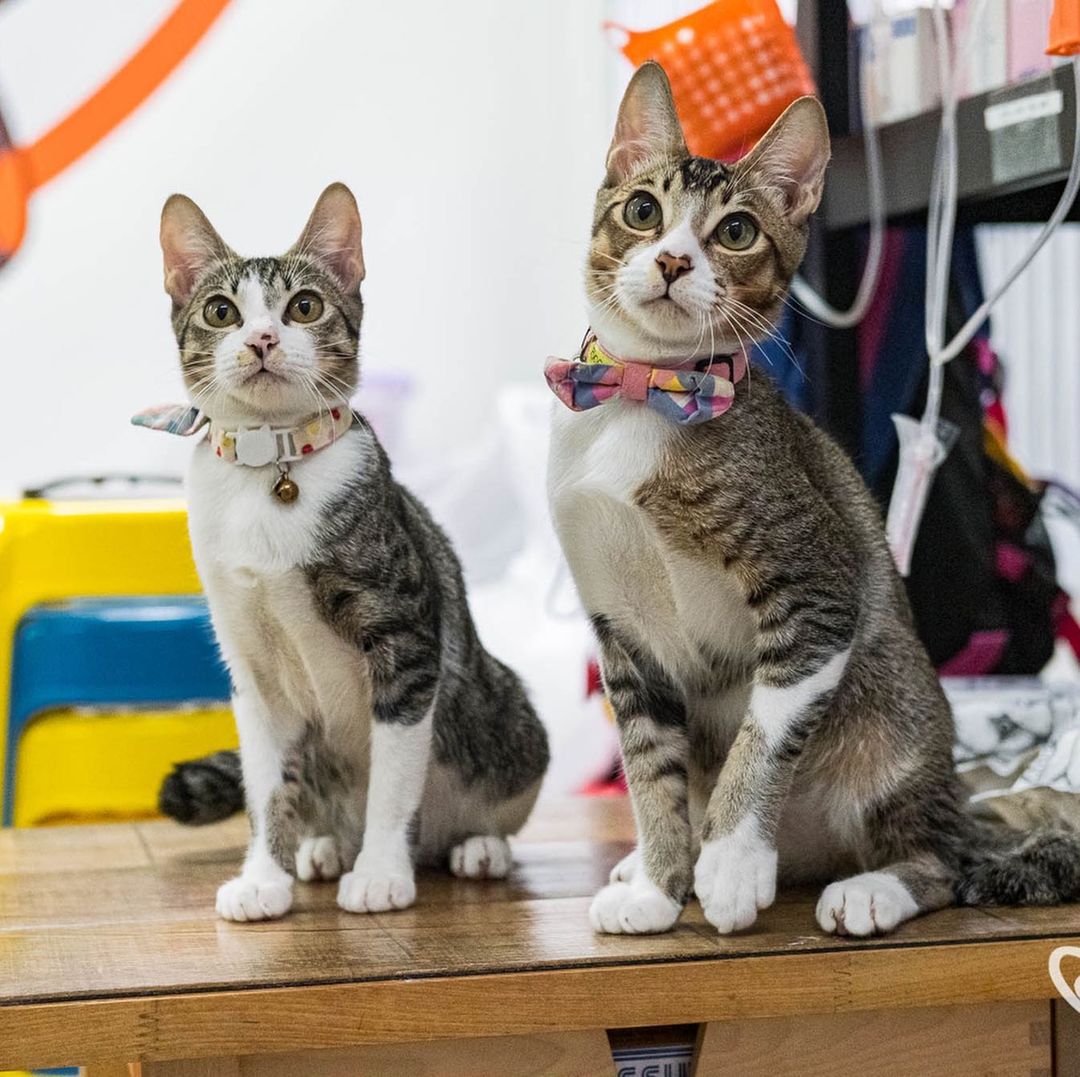
Image credit: @luvkuching via Instagram
Here are some places where you can start your search:
- SPCA: Fees from $25-$200 depending on age and breed. Covers vaccination, sterilisation, deworming, microchipping and registration.
- Kitten Sanctuary: Fee of $80-$150.
- Causes for Animals: Fees from $100-$150. Covers vaccination, deworming, flea and tick treatment and microchipping.
- Project Luni: No adoption fees, but adoption donations are encouraged. Covers vet checks, deworming and vaccination.
- Animal Lovers League: No adoption fees.
- Love Kuching Project: Fee of $65.
There are also Facebook groups where rescuers and fosterers often post adoption notices. Adoption fees usually vary depending on the fosterer and whether a kitty has required extensive vet treatments, grooming and lodging. These should cost no more than $150, but if they do, fosterers should provide receipts for these.
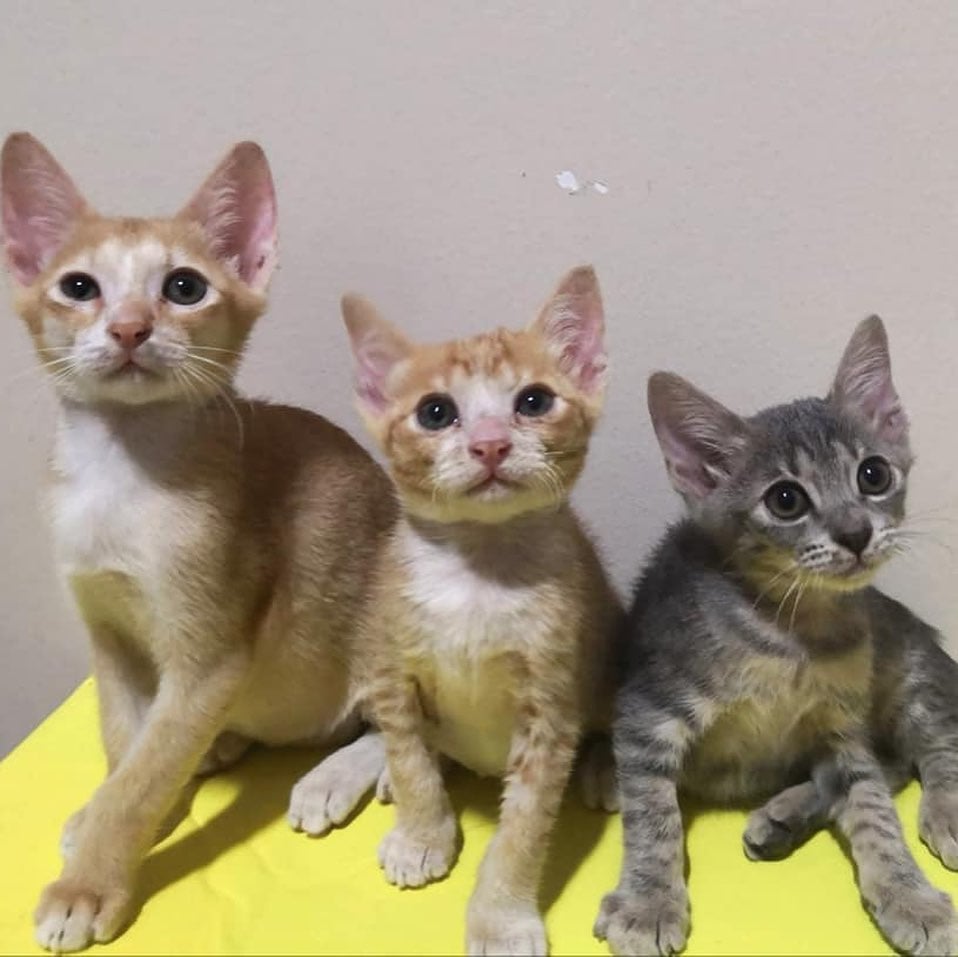
Image credit: @catwelfaresociety via Instagram
Adoption groups and pages:
When adopting a cat, be prepared to expect house visits from fosterers, and provide proof that your home is cat-proofed. These requirements are usually in place to protect the welfare of the cat and to ensure that adopters are ready to make a lifelong commitment for these cats.
Note: Avoid picking any ol’ cat off the street. These may be community cats with dedicated feeders and they may have difficulty adapting to a life indoors.
Buying a cat
If you’re looking for a specific cat breed, you may want to seek out catteries that support and practice ethical breeding.
Legitimate breeders should possess a valid Animal Veterinary Service (AVS) license, and will only sell you pets with a clean bill of health. These cats should also be sterilised, microchipped and vaccinated, and come with a contract agreement to ensure they’re well-taken care of and to avoid abuse or misappropriation.
Breeders should also be able to provide proof that their breeding cats go for regular vet checkups and are healthy. Legally-bred cats can cost anywhere from $1,000 and above depending on breed and pedigree lineage.

TheSmartLocal obtained Pika from Playground Ragdolls.
Image credit: @pikatheragdoll via Instagram
A good way to suss out legit breeders is to join Facebook groups for the specific cat breed you’re looking for. Ask around to see if the cattery you’re looking at is reputable.
Avoid buying cats from backyard breeders (BYB) – a.k.a. illegal breeders without licences. They usually sell purebred or mixed breed cats at a much more affordable price below $1,000. But these cats usually do not have a veterinary history, are not neutered, and are sold as very young kittens below 3 months old.
Pet shops may also have kittens and cats for sale, but always check if they have relevant paperwork such as certs and medical history for their cats.
Cat-proofing your home
“Cat-proofing” is a word you’ll hear a lot once you start your search for your kitty companion.
The first thing you’ll need to do before bringing your cat home is to securely mesh all your windows and balconies. Cats are incredibly curious and have the ability to scale high ledges with zero fear. Unfortunately they’re pretty clumsy too – many cats die from falling off high-rise buildings, so meshing your home is a must.
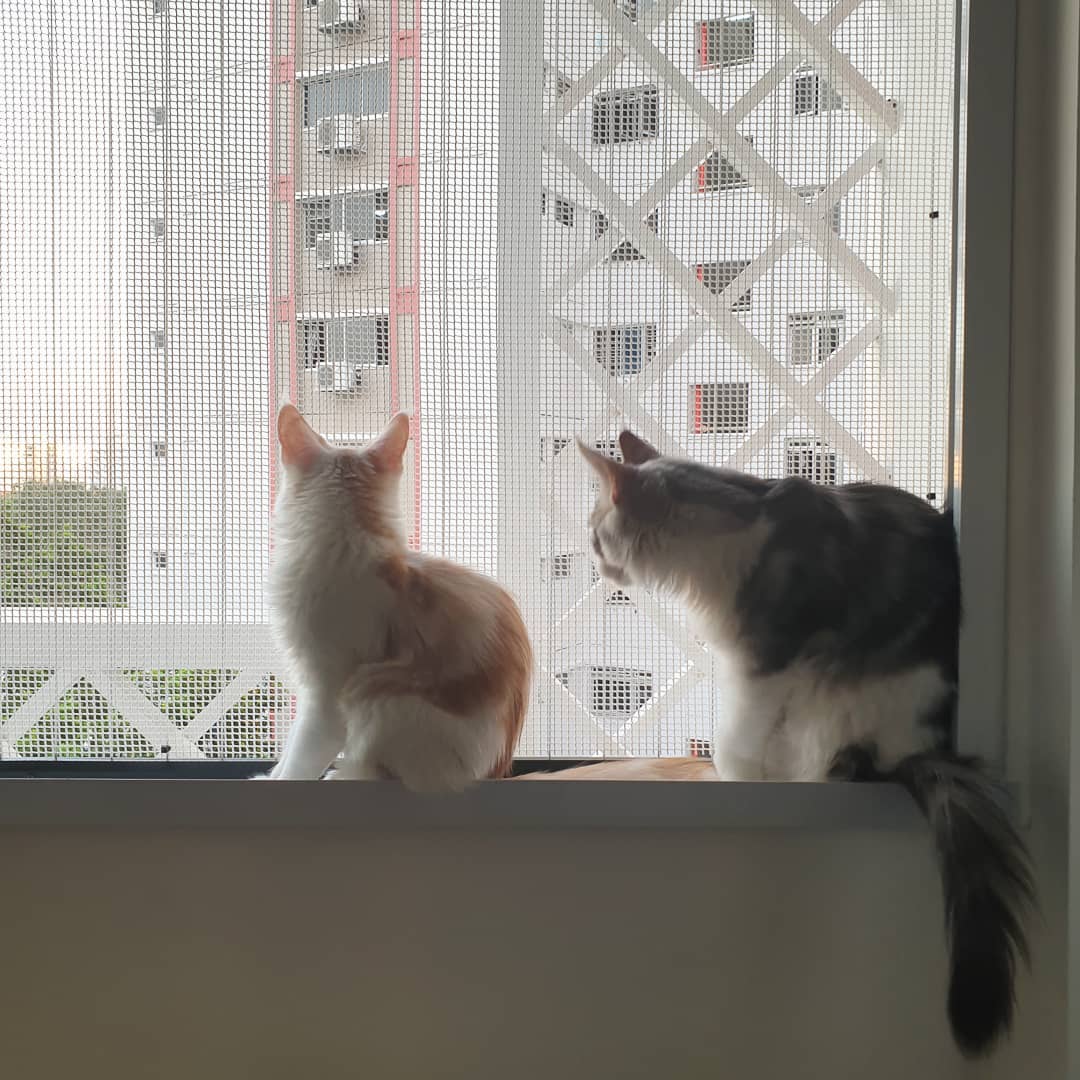
Image credit: @themaingoons via Instagram
Avoid flimsy mesh like mosquito netting or magnetic mesh that can easily be ripped off by your cat. Invest in sturdy ones or hire a professional to install it – always tug the mesh hard to see if it’s secure enough. Grills are also an alternative, but they should have gaps between 1 – 2 inches so that your cat cannot squeeze out.
Other ways to cat-proof your home:
- Ensure the plants you have are not poisonous to cats, in case they chew on them. Common ones that are poisonous to cats are aloe vera and snake plants.
- Secure precious belongings inside lockable cabinets as cats love to jump onto high surfaces and shelves.
- Keep loose wires out of reach as cats may chew on them.
- Protect your furniture by buying lots of scratching posts and cat trees for your cats. There are deterrents like sprays and sticky tape you can find at pet stores, but these are not 100% effective.
P.S. Avoid letting your cat roam outdoors. It may get into fights with strays, breed, cause complaints from neighbours, catch illnesses and parasites, or simply go missing.
Shopping checklist for your first cat

Image credit: @nekojam via Intagram
If you’re bringing a cat home for the first time, you’ll need to stock up on some essentials. Here’s a breakdown of the estimated costs:
- Litter box: From $15. Get at least one litter box per cat.
- Cat litter: From $7.45/5kg. Litter prices depend on type and quantity.
- Cat food: From $0.80/packet of wet food; from $6.50/1.2kg of dry food. Prices depend on quantity, type and brand.
- Bowls: ~$10. Stainless steel or glass bowls are best for hygiene.
- Cat carrier: From ~$30.
- Scratching posts and cat trees: Prices vary depending on design. Costs an average of $30 for basic ones.
- Cat toys: ~$4 for teasers.
- Deshedding brush: From $20. To limit hairballs and shedding.
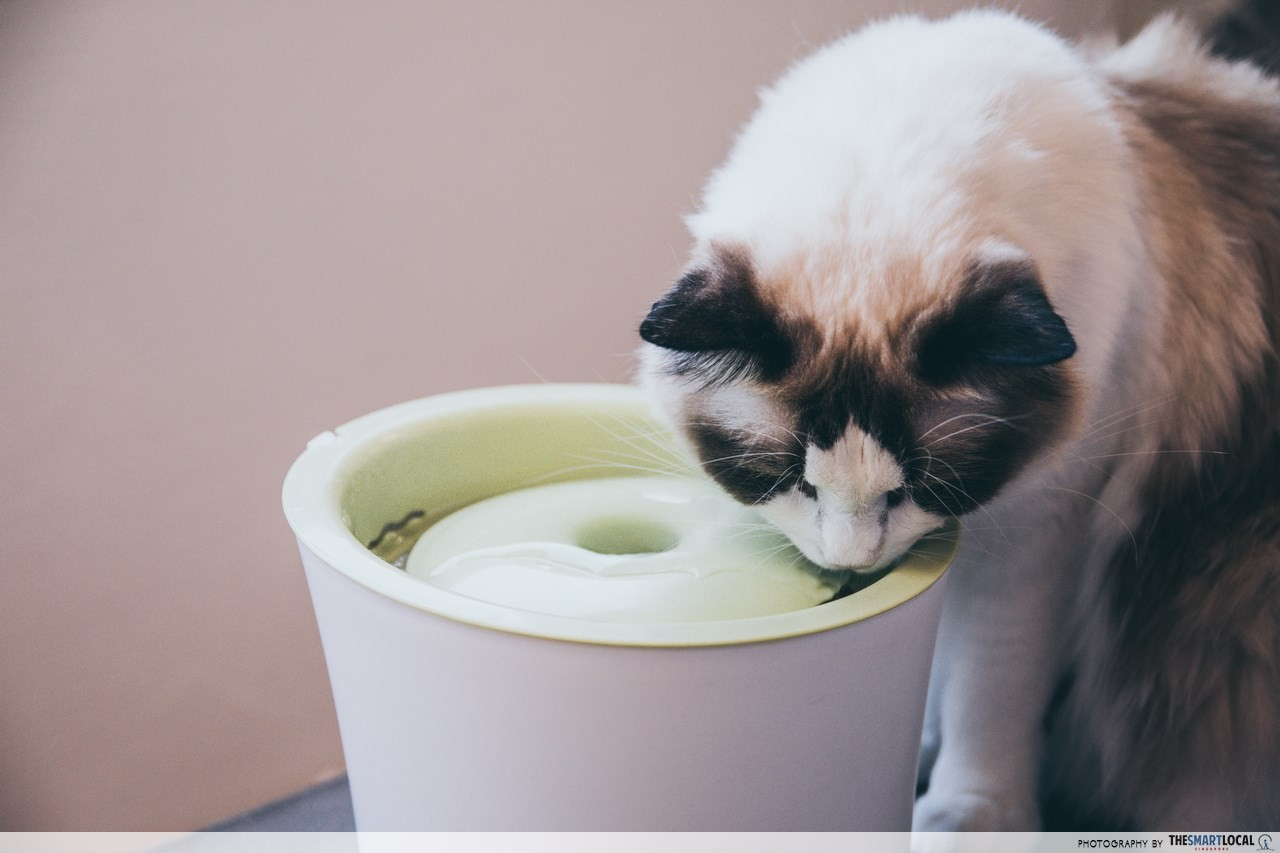 Get a water fountain to encourage fussy cats to drink more water
Get a water fountain to encourage fussy cats to drink more water
Optional:
- Water fountain: From $30. Cats prefer to drink running water so it’s good to invest in a fountain.
- Cat treats: From ~$1.50/packet. Can be used with interactive toys or to train them to do simple tricks.
- Nail clipper for cats: From ~$5. To trim cats’ nails.
- Cat shampoo: From ~$8/500ml. For the occasional bath.
- Cage: Price varies according to size and type. Should only be for temporary use with a layered bottom so your cat doesn’t have to walk and lay uncomfortably on grills.
You can get most of these items from physical pet stores like Pet Lovers Centre or any supermarket. Else, there are plenty of online pet stores which offer competitive prices and an extensive range of pet supplies.
Cat maintenance – how much it costs and how to care for them
Cats are relatively low maintenance pets. Unlike dogs, they don’t require regular baths, going out for walks, or strict training.
There are only 2 items you’ll need to regularly stock up on when you own a cat: food and litter. These costs differ depending on what brand and type of product you choose. If you go for affordable brands that you can find at supermarkets, your monthly cost can be as low as ~$15 per cat for a 5kg bag of litter and a 1.2kg bag of dry food.
But of course, cat owners are recommended to have a mix of dry and wet cat food with good nutrition to avoid health problems. Food with better nutrition generally costs more (~$50/month), but your cat’s health is worth it!
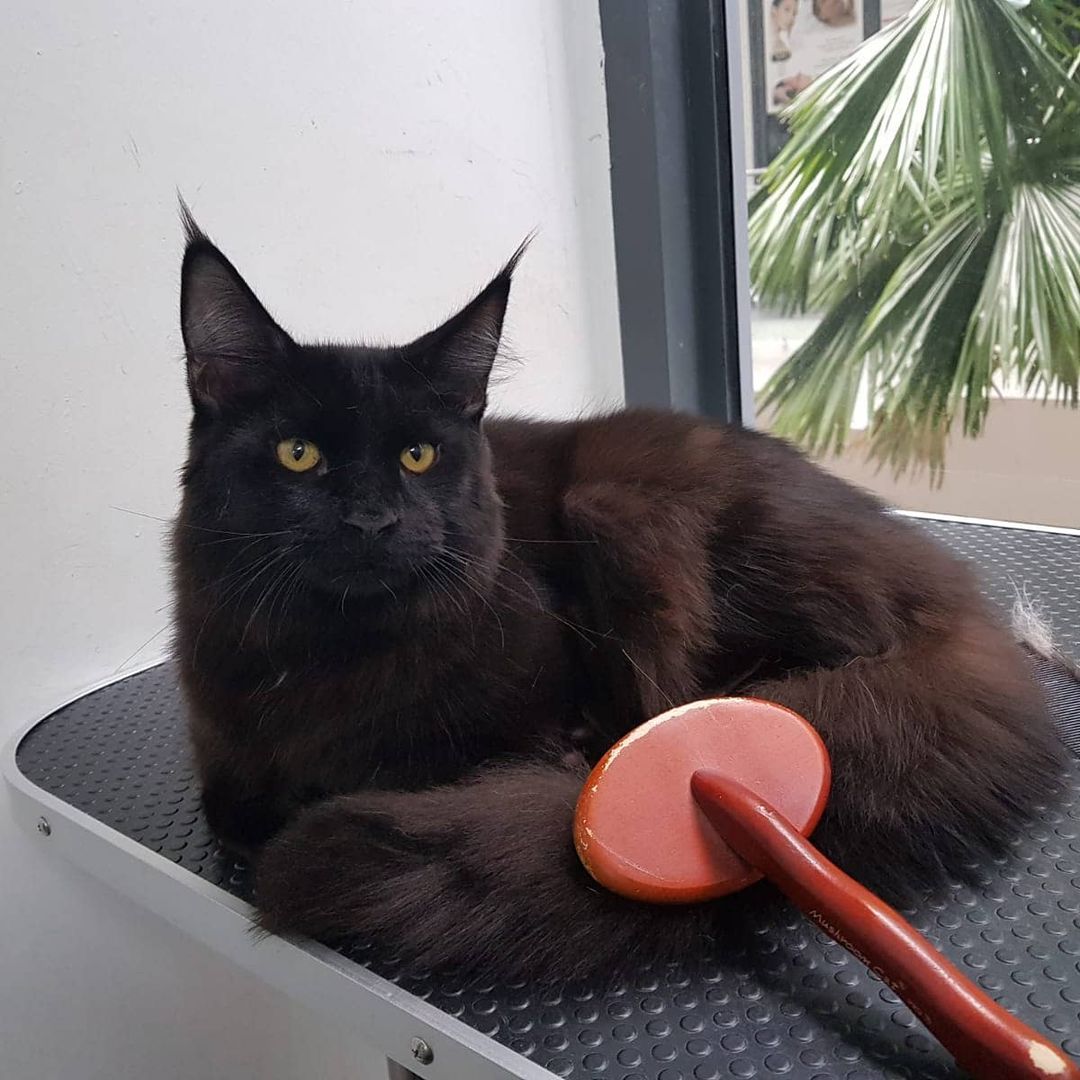
Cats don’t really require baths, but it’s recommended to brush their fur regularly.
Image credit: @puttfectmeowssg via Instagram
If your cat has long hair, you may also want to send it for professional grooming every quarter, which costs from $50. Additional long-term costs you can expect include booster vaccinations (from ~$40) once every three years.
Some basic cat care tips:
Feeding:
- Kittens below 7 months old should be fed around four times a day with about ¼ cup of kitten food per feeding.
- Cats above 7 months old only need to be fed around two times a day with about ½ cup of food daily.
- It’s recommended to also include wet food into your cat’s daily diet to ensure it gets enough hydration.
- If you’re using a water bowl for your cat, wash the bowl and refill with fresh water once a day.
Litter:
- For better hygiene, change out and wash your litter box completely every two weeks.
- Clear your cat’s poop and clumps from the litter box at least once a day.
Grooming:
- Short hair cats should be brushed once a week; medium to long hair cats twice a week.
- Trim your cat’s nails every two weeks if it allows you to. Take care not to cut its blood vessels.
- Cats don’t really require baths since they groom themselves regularly, but you can do so once a month. Avoid bathing them too often as it may dry out their skin.
- Use pet-safe wipes or damp cotton balls to clean their paws, ears, eyes and noses if you notice residue on it.
Bringing your first cat home
The biggest hurdle you’ll probably face with your new cat is introducing them to their new life with you.
Basic vet checkup (~$45): This is the first thing you’ll need to do to ensure your cat is healthy. If you’ve adopted a stray, you may need to vaccinate it (from ~$40), microchip it (~from $50), and sterilise it (~$150). It’s also recommended to deworm (from ~$5) and deflea (from ~$30) them.
Acclimatising: Depending on how well your cat adjusts, it can take anywhere from one week to a couple of months for your cat to get used to your home. One way to smoothly transition your cat is to restrict it to one area of your home for about a week with their litter box, food, water and toys.
After that, allow them to explore the rest of your house, supervised. Let them freely roam all the rooms in your home one by one, a few days at a time. A cat that’s comfortable with its surroundings will hang around open areas, walk around with its tail in the air, and know where to find its litter box and food.
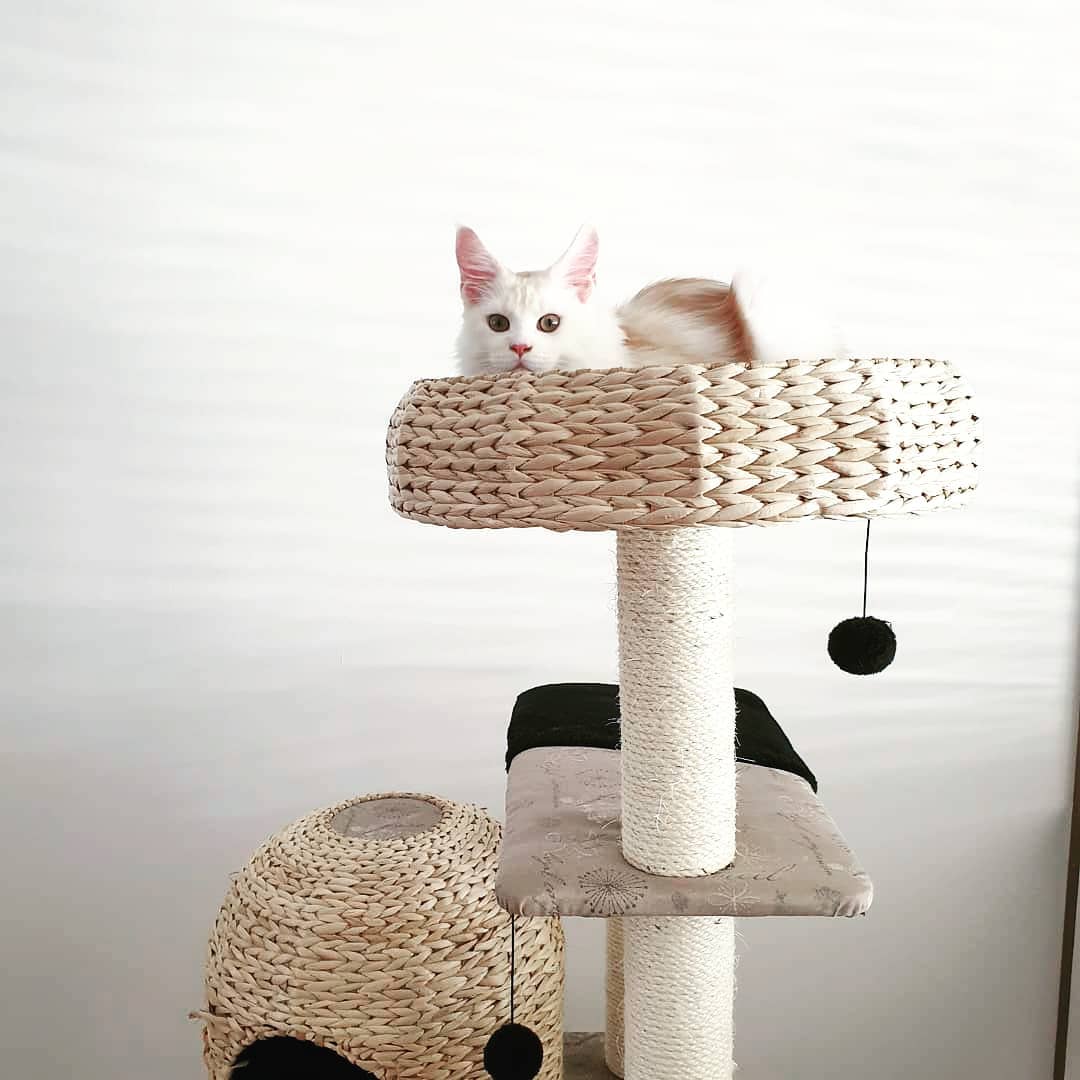
Get “furniture” for cats such as cat trees
Image credit: @themaingoons via Instagram
Litter training: If your cat isn’t litter trained, you might need to confine it to this area for a longer period of time. To litter train your cat, put it in the litter box and let it sniff the litter. If your cat still doesn’t use the box, consider changing the type of litter you’re using.
Scaredy cats: Some cats may react negatively to their new home, especially those that have previously been abused, abandoned and neglected. Your cat is probably afraid if it’s constantly hiding under furniture, refusing to eat, pooping outside of its litter box, or hissing and swiping at you.
The best thing you can do is be patient and give it time to come to you rather than try to force them out of hiding.
Common hiccups to expect with a new cat: When cats are introduced to a new environment for the first time, it’s common for them to have a lack of appetite, diarrhoea, hide, or display aggression like hissing. If this persists after a week, bring your kitty to the vet in case there are other underlying problems.
You can also use calming sprays like Feliway (~$29.90) to help them destress and ease them into their new home.
Guide for first-time cat owners
Cats undoubtedly make some of the best companions for humans. Once they settle into a loving home, caring for them is relatively easy too. Just refer to this first-time cat owner guide if you’re unsure where to start!
Here are more resources for pet owners in Singapore:
- Pet grooming salons in Singapore
- 24-hour vets in Singapore
- Places for animal lovers to volunteer at
- Places to adopt dogs, cats & rabbits
- Online pet stores with delivery
Cover image adapted from: @save_our_kittens_suffolkpark & @kobe.and.mochi via Instagram
A portion of this content may contain referral links to products. However, all opinions are ours.
Article originally published on 10th Jan 2021. Last updated on 15th May 2024.
